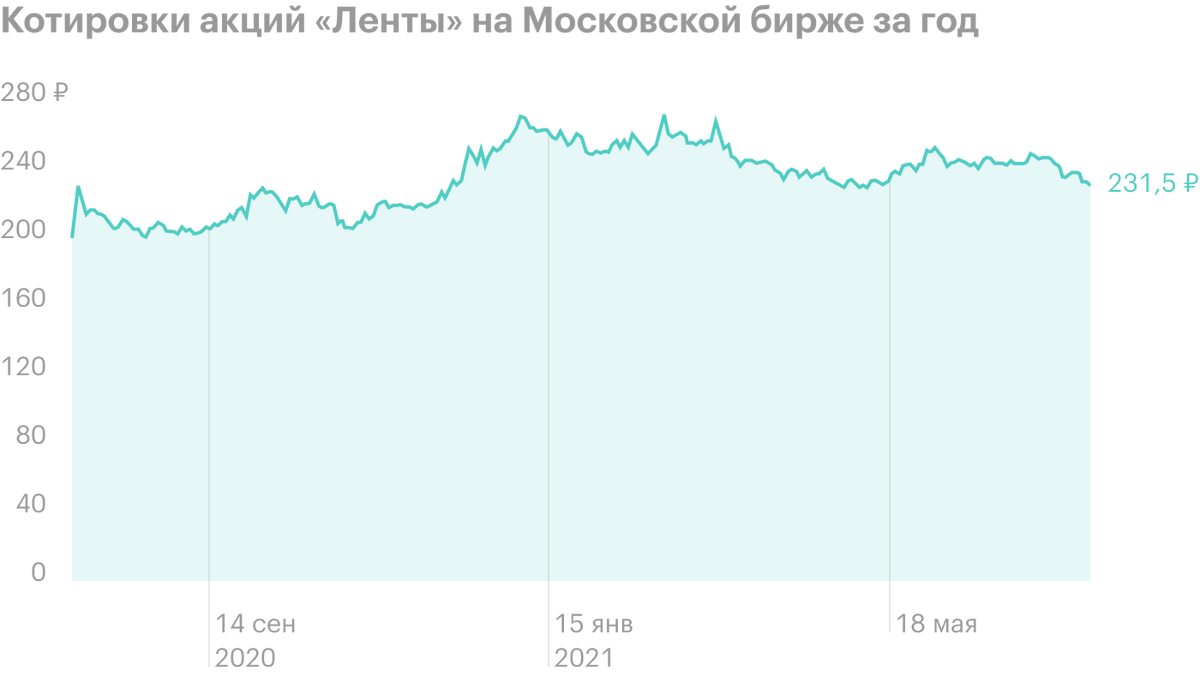
"Ribbon" (MCX, LSE: LNTA) — grocery retail chain, the largest hypermarket operator in Russia with a constantly growing market share. The company was founded in 1993 year in St. Petersburg.
About company
By the end 1 quarter 2021 the network included 254 hypermarket in 89 cities of the country and 140 supermarkets in Moscow, St. Petersburg, Siberia, Central region and Ural. The company is gradually increasing the number of both hypermarkets, as well as supermarkets, about three-quarters of the total area of retail premises is owned by her. The company also has 13 distribution centers and own logistics infrastructure.
Revenue is well diversified by regions of presence - only St. Petersburg and the Leningrad Region share a little more than 20%.
Lenta has an extensive loyalty program: about 16 million participants, 97% purchases are purchases made using loyalty cards, which helps the company understand the needs of its customers, use big data technologies for analytics and the formation of personal offers.
The company is also actively developing its own brands. (STM). This 13 food and non-food brands in all price categories: "365 days", Sweet Tree, Little Times, Home Club and others. Based on the results of 2020 the share of private labels in retail sales reached 14,7%.
Like other companies, Lenta began to actively develop online sales with the possibility of self-pickup or delivery by its own Lentochka express delivery service or partner services.
Revenue of the largest food retailers in Russia in 2020 year, billion rubles
| X5 Retail Group: "Pyaterochka", "Crossroads", "Carousel", "Chizhik" | 1973 |
| "Magnet" | 1510 |
| "DKBR Mega Retail Group Limited": "Dixie", "Bristol", "Red and White", "Victoria", Megamart, "First thing" | 950 |
| "Ribbon" | 438 |
| Auchan retail Russia | 255 |
| Metro Cash & Carry | 204 |
| "Traffic light" | 189 |
| GC «Okey»: "OK", "Yes!» | 173 |
X5
Company share in the hypermarket market by years
| 2016 | 18,7% |
| 2017 | 21,9% |
| 2018 | 24,5% |
| 2019 | 25,0% |
| 2020 | 28,0% |
Number of company stores by type by year
| Hypermarkets | Supermarkets | |
|---|---|---|
| 2017 | 231 | 97 |
| 2018 | 244 | 135 |
| 2019 | 249 | 131 |
| 2020 | 254 | 139 |
| 2021 | 254 | 140 |
Share of the company's revenue by region for 1 neighborhood 2021 of the year
| St. Petersburg and Leningrad region | 21,5% |
| Siberia | 18,0% |
| Volga region | 13,0% |
| Moscow and Moscow region | 12,3% |
| South Region | 11,9% |
| Ural | 10,0% |
| central region | 7,6% |
| Northwest region | 5,7% |
Change of ownership and its consequences
IN 2019 year, a very important event happened for the company: its controlling shareholder has changed. They became "Severgroup" of the richest Russian Alexei Mordashov, whose assets include significant stakes in the metallurgist Severstal, travel company TUI, Utkonose and many other companies.
Naturally, under the new owner, the company has undergone many changes. Significantly changed the composition of the Board of Directors and the Management Board: now there are many people with experience in Severgroup and Severstal. The general director was replaced - it was Vladimir Sorokin, previously worked as deputy head of Magnit, and even earlier managed the network "Crossroads".
Company registration changed from British Virgin Islands to Cyprus, then they redomiciliated to Oktyabrsky Island in the Kaliningrad Region, which will entail the delisting of the company's depository receipts from the Moscow Exchange in favor of its shares. This is a technical procedure, which should not cause concern among investors, especially since the company's depositary receipts will continue to be traded on the London Stock Exchange.
The company has published a new strategy with ambitious revenue growth plans in 2 times - up to a trillion rubles - to 2025 year. It is planned to achieve it through the active development of convenience stores, purchases of competitors and development of online directions. "Lenta" indicates examples of many European countries, where the grocery retail market is quite consolidated: the share of the five largest players exceeds 50%, and that and 70% market. In Russia, according to the results 2020 year this figure was only 30%. The company predicts this share will grow to 40% to 2025 year and plans to actively participate in this.
In January 2021 of the year "Lenta" launched test discounter stores under the brand "365+". The company also actively began to conclude deals M&A: hypermarket "Karusel" in the Moscow region, Family network in the Perm region and Billa in the Moscow region. Also "Lenta" has combined some business functions, in particular procurement, with sister business — "Utkonos".
Share capital structure of the company
| "Severgrupp" | 77,99% |
| Quasi-treasury shares | 0,93% |
| Directors and management | 0,04% |
| Free float | 21,04% |
«
Financial indicators
Lenta's revenue is growing steadily, what can you say about net profit: she is quite volatile, and in 2019 year the company even slipped into losses. At the same time, net debt has been kept in approximately the same range in recent years..
The revenue structure shows very clearly, that the main business of Lenta is hypermarkets: they account for 90% proceeds.
Financial performance of the company, billion rubles
| Revenue | Net profit | net debt | |
|---|---|---|---|
| 2017 | 365,2 | 13,3 | 92,8 |
| 2018 | 413,6 | 11,8 | 93,3 |
| 2019 | 417,5 | −2,8 | 77,1 |
| 2020 | 445,5 | 16,5 | 91,6 |
| 2021 | 218,1 | 5,1 | 93,7 |
Revenue by business segment for 1 neighborhood 2021 of the year
| Hypermarkets | 90% |
| Supermarkets | 9% |
| Wholesale | 1% |
Hypermarkets
90%
Supermarkets
9%
Wholesale
1%
Why stocks can go up
Growing company. Lenta's business has grown gradually in recent years, and now the company plans to grow much more intensively. If it all works out, then its revenue will double in the next few years, what will be the fundamental driver for the growth of stock prices.
Defense sector. Grocery retail is traditionally a defensive sector, as it sells essential goods. That is why its representatives are obvious candidates for inclusion in the conservative parts of investor portfolios.. Now the demand for protective papers may increase even more.: due to increased inflation, the growth of interest rates in Russia has already begun, it can start in the West too, and this is, in its turn, can trigger a correction in the stock markets.
Maybe, because of these expectations, investors will be more willing to invest in companies from defensive sectors.
Improper multipliers. Lenta has good multipliers both in dynamics, and in comparison with competitors: Yes, it is somewhat less efficient and more credited, than bigger competitors, but the market value is much cheaper, as seen from its P / E.
Possible start of dividend payments. The company plans to 2021 to approve the dividend policy, and with 2022 year to start payments. In Russia, they especially like dividends, so their appearance could make Lenta much more attractive to investors.
Why stocks might fall
Sector specifics. Grocery retail is not a fast-growing sector, it is very dependent on the level of income of the population, and lately he, Unfortunately, falls. At the same time, the sector is extremely competitive.: there are a huge number of traditional players on the market, and actually IT companies, engaged in the digitalization of this area: Ozone, Wildberries, «Yandex». And the higher the competition, more cost and less profit.
Against the background of falling incomes of the population and rising inflation, the government is trying to regulate food prices, which is hardly profitable for retailers: in December 2020 signed a number of regulations to stabilize food prices, in July 2021 discussions began on lowering margins on essential goods, and Lenta’s competitor Magnit, as part of the approval of the Dixy consolidation deal, was ordered to make a zero markup on several basic food products for a whole year.
Hypermarkets problems. In the review of Okaya, we have already spoken in detail about, that hypermarkets are a somewhat fading retail format in Russia, Convenience stores and discounters are now becoming more popular. At the same time, hypermarkets are the backbone of Lenta's business., so the company is sort of swimming against the tide. And although she rather succeeds, it is not easy.
Lack of dividends. The company plans to start paying dividends, but so far she has never paid them in her entire public history, what distinguishes it not for the better from public competitors in the sector.
Potential Growth Problems. The company plans to actively grow - both by opening new stores and developing the online segment, and buying up competitors. But all this requires money - and a lot of it.. And options, where to get them, limited quantity. Probably, the company will increase the debt - and it is already rather big - and then it will have to be serviced and paid. Maybe, the company will resort to an additional issue of shares, which is also not very good for shareholders, as their stake in the business is diluted.

Lenta multipliers by years
| P / E | ROE | Net debt / EBITDA | |
|---|---|---|---|
| 2017 | 12,3 | 18,5% | 2,61 |
| 2018 | 8,83 | 14,3% | 2,58 |
| 2019 | Lesion | Lesion | 1,95 |
| 2020 | 7,06 | 17,5% | 2,04 |
| 2021 | 9,01 | 12,7% | 2,31 |
P / E
2017
12,3
2018
8,83
2019
Lesion
2020
7,06
2021
9,01
ROE
2017
18,50%
2018
14,30%
2019
Lesion
2020
17,50%
2021
12,70%
Net debt / EBITDA
2017
2,61
2018
2,58
2019
1,95
2020
2,04
2021
2,31
Multipliers of public grocery retailers for 2020 year
| P / E | ROE | Net debt / EBITDA | |
|---|---|---|---|
| X5 Retail Group | 22,4 | 29,8% | 0,99 |
| "Magnet" | 15,8 | 18,0% | 0,68 |
| "Ribbon" | 7,06 | 17,5% | 2,04 |
| "OK" | Lesion | Lesion | 1,93 |
P / E
X5 Retail Group
22,4
"Magnet"
15,8
"Ribbon"
7,06
"OK"
Lesion
ROE
X5 Retail Group
29,8%
"Magnet"
18,0%
"Ribbon"
17,5%
"OK"
Lesion
Net debt / EBITDA
X5 Retail Group
0,99
"Magnet"
0,68
"Ribbon"
2,04
"OK"
1,93
Eventually
Lenta is a large grocery retailer, who wants to get even bigger: significantly increase revenue, increase market share and start paying dividends. If you assume, that the company will succeed, maybe, now is a good moment, to become a shareholder. But do not forget, that along the way, Lenta will face high competition, high cash costs and not the best environment in the retail sector in general and in the hypermarket subsector in particular.
